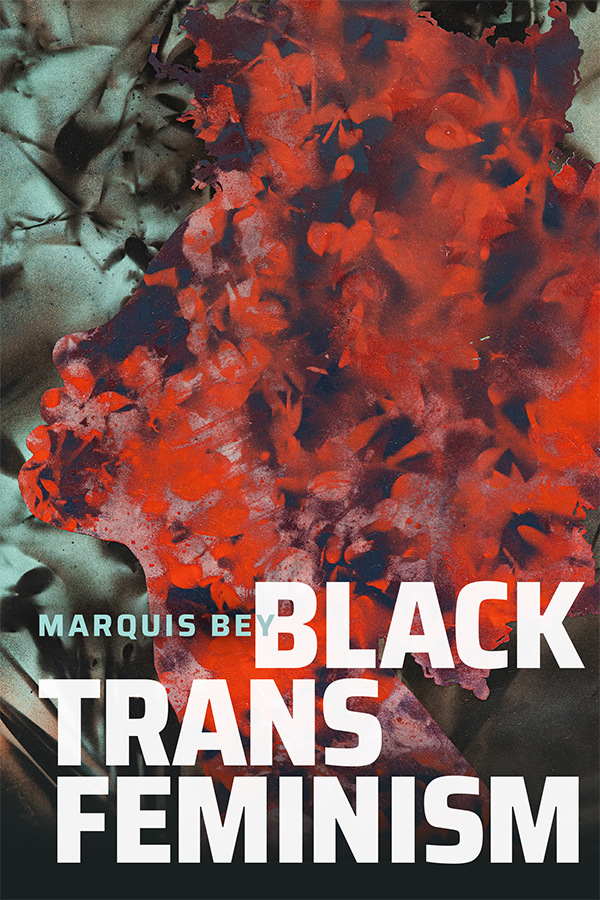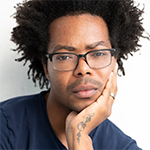Marquis Bey
Black Trans Feminism is about how we might think about those terms in the title differently, and perhaps more radically. Typically, it is assumed that we know what blackness is, what transness is, what feminism is, and typically we define them in very simplistic ways—i.e. blackness is a racialized skin color, transness is a characteristic of someone who “switched” from one gender to the “opposite” gender, feminism is about empowering women. But my book challenges all of these assumptions and tries to offer different definitions of these things: blackness as a disposition or posture of subversion, transness as a refusal of gender itself, feminism—always, in fact, a black and trans feminism—as a fracturing of the tenets of racialized gender norms.

NOTCHES: What drew you to this topic, and what questions do you still have?
Marquis Bey: I was drawn to this topic because I found myself constantly feeling stuck and unable to truly break out of the, frankly, boring ways people often thought about justice. It was always intersectionality this, center the most marginalized that, and while those ways of combating injustice are understandable, they simply were not enough for me. I needed more. So, in conversation with a bunch of scholars that appear in the book, I sought to write something that went further than the typical discourse. I wrote, in short, a more radical treatise on how we might get free.
NOTCHES: This book engages with histories of sex and sexuality, but what other themes does it speak to?
MB: Other themes spoken to include race, gender, and racialized gender; they include poetry and politics and language; history and fugitivity. It is a sprawling book, to be sure, but it is also a book that wants to go deeper than a surface level relativism or social constructionism (i.e., the belief that everything is relative and nothing is inherently better or worse than anything else, and the belief that social categories are not natural but a construct of social histories). And it speaks to these themes in ways that, on the one hand, are necessarily dense and difficult for such a dense and difficult topic; but, on the other hand, it speaks to these themes in ways deeply personal, straightforward, and grounded in ideas from a range of thinkers—from scholars and activists to poets and Twitter (excuse me, “X”) posts.
NOTCHES: Whose stories or what topics were left out of your book and why? What would you include had you been able to?
MB: In some ways, I think my own story was left out. I would have loved to include more personal stuff in the book, but the genre of the book didn’t quite allow for that. And that’s fine; I put myself on the page in other things I’ve published. Additionally, I think the stories of trans masculine folks were left out as well. There is an implicit understanding that to talk in any way about trans feminism one necessarily has to talk about trans women. And while I trouble that exact assumption, I still found myself thinking primarily with trans women and femmes, so it would have been interesting to include the voices and ideas of trans masculine people.
NOTCHES: Did the book shift significantly from the time you first conceptualized it?
MB: I would say not quite. It began as a dissertation, which is very different from the book itself, for sure. But I had a clear idea of what I wanted, and perhaps needed, the book to do. The overall argument did not change; it only got deeper and stronger. I added things here and there and included a more diverse set of thinkers, but conceptually the book was pretty sure of itself from the outset.
NOTCHES: How did you become interested in the history of sexuality?
MB: I became interested in the history of sexuality, and more specifically non normative genders, really in undergrad. I found myself beginning my thinking in a pretty typical feminist way—gender equality; women’s rights; you know, the typical stuff—and found myself also, because I was a philosophy major in college (in addition to American Studies and English), routing this feminism through philosophy. Long story short, I kept pushing in more radical directions and ended up a critical theorist of black and trans feminism.
But what really is important here is that reading people like Foucault or Judith Butler or Hortense Spillers or Denise Ferreira da Silva or C. Riley Snorton made me unable to simply go along with the status quo. Reading, and being impacted by the words I read meant that I couldn’t not be changed. And that’s why I wrote Black Trans Feminism: so someone or someones out there can no longer be the same after encountering the book. They can no longer think this or that normative thing about gender or sexuality now. Or, they can know that there are others who do in fact think the way they do, in more affirming ways. As C. Riley Snorton, black trans studies scholar and my graduate mentor, has said, “The goal is that someone will pick up an article or pick up a book and feel more free having read it than they did before.”
NOTCHES: Your book is published, what next?
MB: Now, I’m working on a three-volume collection of critical essays on “jailbreaking.” I remember reading a couple years ago an article by Kelly Hayes and the abolitionist Mariame Kaba and the title of that article was “A Jailbreak of the Imagination.” I was enchanted by that essay, and found myself gravitating toward the language of jailbreaking as a way to think about abolition differently. So, my current project is bringing the language of jailbreaking to bear on these big identity categories we take for granted—gender, race, and class—and asking the question of how to jailbreak from them.

Marquis Bey (they/them) is Professor of Black Studies and Gender & Sexuality Studies, and core faculty of English and Critical Theory, at Northwestern University. Their work concerns, generally speaking, trans and nonbinary studies, black feminist theory, abolition, and philosophy. Most recently, they are the author of Black Trans Feminism and Cistem Failure: Essays on Blackness and Cisgender.

NOTCHES: (re)marks on the history of sexuality is licensed under a Creative Commons Attribution-NonCommercial-NoDerivatives 4.0 International License.
Based on a work at www.notchesblog.com.
For permission to publish any NOTCHES post in whole or in part please contact the editors at NotchesBlog@gmail.com




